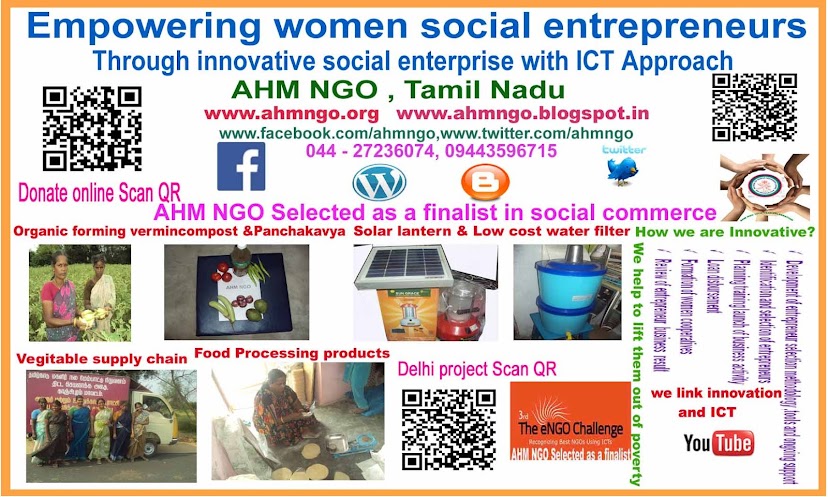
3/13 Madha Koil street, Kammalam Poondi Po, Uthiramerur Tk, Kancheepuram - 603046,Tamil Nadu. Official Web:www.ahmngo.org,Latest News blog:www.ahmngo.blogspot.in, www.ahmngo.wordpress.com. Social Issue Blog:www.tamilnadupress.blogspot.in,Siddha blog:www.agatteyar.blogspot.in Ph:04427236074, Mobile: 9443596715
Friday, August 23, 2013
Wednesday, August 21, 2013
Resource Mobilization for ‘Young NGOs’
Are you willing to ‘fight for a cause’ and bring a change in the society? Do you wish to open a new NGO, start it from the scratch, but don’t know where to begin with the planning and how to mobilize resources? Then here are some suggestions that might help you to start and sustain an NGO.
Before starting an NGO, you should formulate realistic goals that are specific, measurable, achievable, and time-bound. Strong words ‘Ending Violence Against Women’ may sound good on your NGO mugs and t-shirts, but they are pointless unless you have a realistic plan of action to solve the problem. Therefore, conceptualization is really important. It involves prioritizing the issues that your NGO wants to address, and identify the mission and objective.
For a new NGO, mobilization of local resources, and contribution from within the local community to assist the implementation of a project or program can be very helpful. The organization can take both financial and non-financial contributions from community members, local institutions, business firms, government, etc. Use of local resources is a key to the sustainability of the organization.
Raising funds in a strategic manner is another important aspect that can help in sustaining the NGO. But before learning the techniques of fundraising, one must understand the changes in the fund raising scenario.
At present, most NGOs in the country are dependent on foreign funding and government funding. According to a report by British paper, The Guardian, figures compiled by the Indian government show that the US is the top donor nation to Indian NGOs, followed by Britain and Germany. The paper said, ‘in the year ending in March 2011, the most recent period for which data is available, about 22,000 NGOs received a total of more than 2 billion dollars from abroad, of which 650 million dollars came from the US.’ However, it should be noted that foreign fund flows to India have reduced as the country witnessed significant growth in economy. Now, NGOs in India are not solely dependent on International donor agencies as the Government has started taking initiatives to provide significant support to NGOs, to further the country's development goals.
Enthusiastic ‘newbies’ must understand that running an NGO is not so easy and it needs much more than just good intentions to keep it running. Before starting your own NGO it is advisable to work with a similar organization to gain some experience. It would be eaiser for you to set up an NGO if you get exposure to the different sectors of a non-profit sector, including fieldwork, fundraising, administration, balancing budgets, writing proposals etc. ‘Testing the waters’ can also play a crucial role in mobilizing resources more effectively.
NGOs can be very effective if they are accountable to beneficiaries- the people your NGO aims to help. An NGO can lose or gain the trust of its beneficiaries in many ways, and one of the best ways to win their trust could be involving beneficiaries in the decision making process. The organization should try to establish systems which can guarantee that financial resources are managed properly and used efficiently.
It can be useful for an NGO to build a good relationship with the stakeholders. All your dealings with donors and programmes for beneficiaries should build up their confidence in your organization. You can do so by describing them your plan to use funds, outcomes of your projects, and most important – providing an accurate and honest result of the work done by your NGO.
In a bid to sustain your NGO and mobilize resources, you must give your best efforts in building networks. Build ties with people and firms that do similar kind of work and learn from their experiences. Stay connected with donors, stakeholders, institutes with help of social networking sites like LinkedIN, Facebook etc. Most importantly, build your own website that can help you stay connected, attract potential donors and volunteers, and help you spread the goal of your organization.
Careful mobilization of available resources could be a key to successful establishment of your NGO. No matter what challenges you face, you can accomplish more when you have more resources and people supporting your goal and objectives.
By: Isha Sharma
Reference:
- See more at: http://career.indevjobs.org/resource-mobilization-for-young-ngos-by-isha-sharma.htm#sthash.WqLgtM8l.dpuf
-
Subscribe to:
Posts (Atom)







